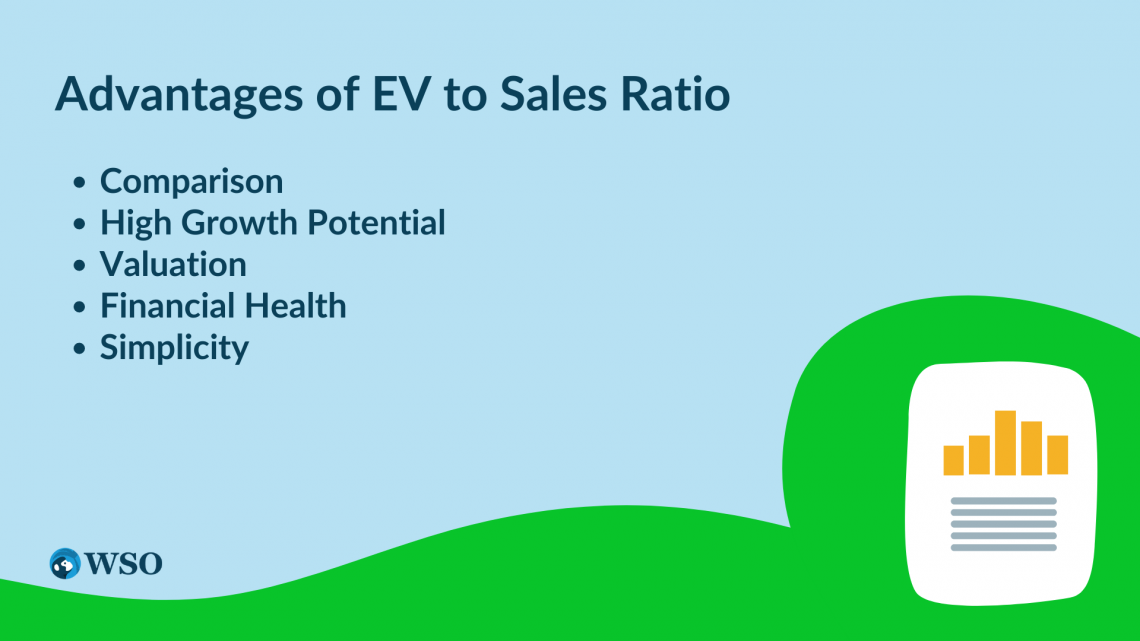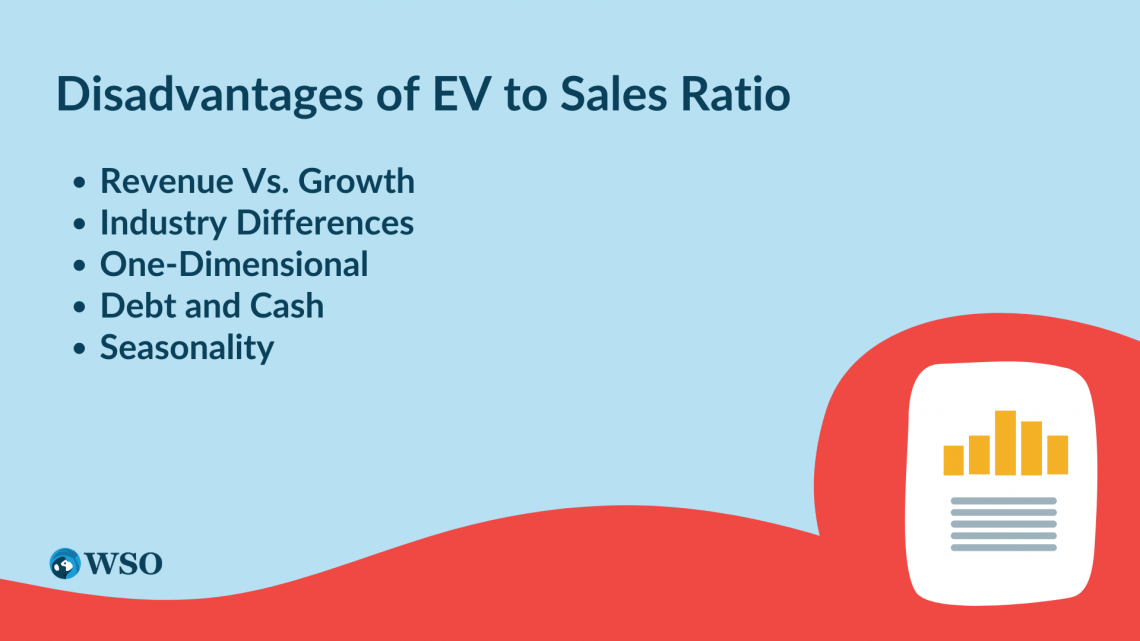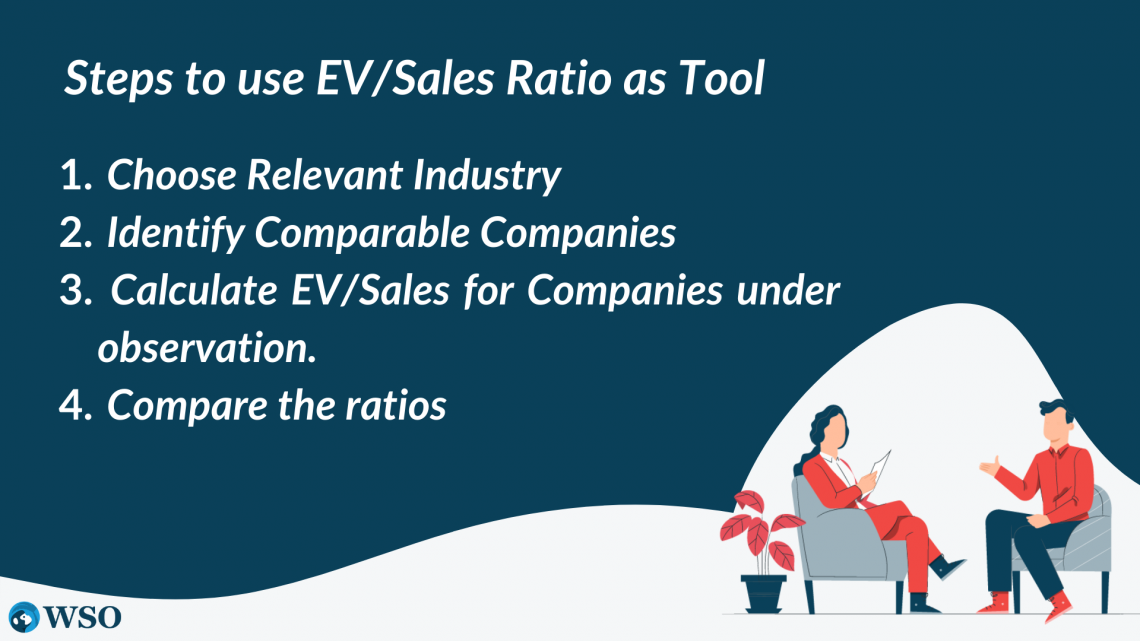Enterprise Value-to-Sales (EV/Sales)
A financial statistic that helps assess the cost of acquiring the value of a firm in terms of its sales.
What Is Enterprise Value-To-Sales (EV/Sales)?
The enterprise value-to-sales (EV/sales) ratio is a financial metric that enables assessing the cost of acquiring the value of a firm in terms of its sales. The ratio determines a company's worth and compares it to its industry and peers.

A firm's Enterprise Value (EV) is a measure of its entire value that includes its market cap, debt, and preferred shares. Investors can use the EV/sales multiple to calculate a business's worth based on sales while also accounting for equity and debt held by the company.
Enterprise Value-to-Sales Ratio assists investors in evaluating if an organization is overvalued or undervalued compared to its peers. In addition, investors use the EV/Sales ratio to compare firms within the same industry or sector.
The price-to-sales (P/S) valuation, which substitutes market capitalization for enterprise value in the former, is expanded by enterprise value-to-sales. Because enterprise value considers a company's debt when determining its worth, unlike market capitalization, which does not, EV/Sales is said to be more accurate than P/S.
The typical range for EV-to-sales multiples is 1x to 3x.
A firm is a more appealing investment if its EV/sales ratio is lower since it may be comparatively cheap. On the other hand, a greater EV/sales ratio suggests that the firm is overpriced.
Hence, the EV/sales ratio helps investors determine which firms are comparatively inexpensive or costly in terms of sales revenue.
In essence, the EV/Sales ratio is a significant financial indicator that gives information about a firm's growth potential, profitability, and financial stability.
How to calculate enterprise value-to-sales?
Calculating the EV/sales ratio is a fairly simple task.

One requires the following components to evaluate the EV/sales of a company:
- Market cap of the company.
- Total debt held by the company
- Interest held by minority shareholders in the company’s subsidiary.
- Preferred stock
- Cash and cash equivalents
- Company Revenue

Where:
- Enterprise Value = Market Capitalization + Debt + Minority Interest + Preferred Shares - Cash and Cash Equivalents
- Market Capitalization = Number of Shares Outstanding x Share Price
- Debt = Total Long-term Debt + Short-term Debt
- Minority Interest = Interest held by minority shareholders in a subsidiary
- Preferred = Preferred stock outstanding
- Cash and Cash Equivalents = cash and short-term investments such as money market funds
- Revenue = Sales generated by a company during a specific period (e.g., quarter or year)
It is crucial to note that while the calculation for EV may differ somewhat depending on the source, the notion of adding all claims on the firm's assets and removing cash and cash equivalents stays the same.

This signifies that the firm's enterprise value is five times its sales.
What is the significance of calculating EV/sales?
The enterprise value to sales (EV/sales) ratio shows the relationship between the enterprise value of a firm and its revenue. This ratio is used to compare companies in the same sector and to determine a company's valuation concerning its sales.

A high EV/Sales ratio often implies that the business is overvalued. On the other hand, some investors will not mind the high ratio if they anticipate that future sales will climb dramatically and give them higher profits.
The firm is deemed undervalued when the EV/Sales ratio is less than one. There is a lower amount of enterprise value for every dollar of revenue. Investors often view it as a positive investment opportunity since it indicates that the firm is cheap and may deliver immediate profit to investors.
With high and low EV/Sales in mind, comparing the ratio to rivals and the industry is critical. A low EV/Sales ratio compared to the broader market may be extremely high in its specialist business, making it an unappealing investment.
It's vital to remember that this ratio just provides a glimpse of a company's value compared to its revenue and ignores other significant financial measures like profitability, cash flow, and growth potential. As a result, it is typically utilized with other financial ratios and research.
Advantages of calculating EV/sales
Investment experts frequently consider enterprise value-to-sales a very powerful statistic since it gives vital information about a firm, indicating whether or not an investment is profitable.

Calculating enterprise value to sales has various advantages:
1. Comparison
EV/sales may be used to compare firms in the same sector because it indicates a company's valuation of its revenue. This makes it easier to spot businesses under or overvalued about their competitors.
2. Growth Potential
A high EV/sales ratio may imply that the firm has a high growth potential since investors are ready to pay a premium for the company's revenue growth potential.
3. Valuation
EV/sales may be a valuation tool since it indicates how much investors are ready to pay for a company's revenue. This might be beneficial for determining the worth of a firm before investing.
EV/sales may be used to gauge a company's financial health. For example, a firm with a high EV/sales ratio may be considered overvalued, whereas a company with a low EV/sales ratio may be considered undervalued.
5. Simplicity
EV/sales is a straightforward statistic to compute and understand, benefiting both expert and novice investors.
NOTE
It's critical to remember that the EV/sales ratio should be utilized in conjunction with other financial indicators and considered in the context of the unique conditions of a firm, such as its growth potential and competitive landscape.
Disadvantages of EV/sales ratio
While calculating the enterprise value to sales ratio has numerous benefits, this ratio misses out on considering a few vital aspects of the business. Therefore, calculating the enterprise value to sales ratio alone does not help understand the condition of a business completely.

While enterprise value to sales (EV/sales) can be a useful metric, it does have some limitations:
1. Revenue vs. Earnings
EV/sales solely consider a company's revenue, not its profitability. This suggests that whereas a company with low revenue but great earnings may have a low EV/sales ratio, a company with large revenue but bad profitability may have the opposite.
2. Industry Differences
Because EV/sales ratios vary widely among sectors, comparing firms within the same industry is critical when utilizing this statistic.
3. One-dimensional
Because EV/sales only consider one part of a company's financials, it should not be utilized to make investment choices in isolation. Earnings, cash flow, and growth potential are all important financial factors to evaluate.
4. Debt and cash
EV/sales do not account for a company's debt or cash-in-hand. Therefore, a company with a lot of debt and little cash in hand would have a greater EV/sales ratio than one with little debt and a lot of cash in hand, even if the latter is the better investment.
5. Seasonality or cyclicality
The EV/sales ratio does not account for the influence of a company's revenue seasonality or cyclicality, which might affect the ratio.
6. Limited ability to assess the company's progress over time
The EV/sales ratio is a snapshot of a business's valuation of its revenue; it does not provide information about how the firm has performed over time. As a result, while analyzing the firm, it is critical to analyze its previous EV/sales ratios.
Using EV/Sales as a tool for comparison
Enterprise Value to Sales (EV/Sales) can be useful for comparing companies within an industry or sector.

Here are some steps to consider when using EV/Sales for this purpose:
1. Choose a relevant industry or sector:
Choosing an industry or sector closely related to the company you are evaluating is important to make meaningful comparisons. This will help ensure the companies are compared to similar market conditions and operating structures.
2. Identify comparable companies:
After choosing an industry or sector, look for organizations comparable to it in terms of size, business model, and other important aspects. Consider parameters like market capitalization, sales, and product offers.
3. Calculate EV/Sales ratio for each company:
Calculate the EV/Sales ratio for each similar firm you've chosen. You'll get a feel of how each firm is valued about its yearly revenues from this.
4. Compare EV/Sales ratios:
Once you have calculated the EV/Sales ratios for each company, compare them to see which companies are trading at a premium or a discount relative to their peers.
A firm is said to be overvalued if its EV/sales ratio is higher, whereas a lower EV/sales ratio indicates that the business is undervalued.
NOTE
EV/Sales ratio is a helpful tool to gauge businesses. It's also important to consider other aspects like profitability, growth prospects, and debt level. These elements may contribute to painting a fuller picture of each company's financial situation and future.
These methods will help you utilize EV/Sales to compare businesses within an industry or sector in a relevant way. This can assist in locating prospective investment possibilities, hazards, and difficulties.
Key Takeaways
- The enterprise value-to-sales (EV/sales) ratio is a financial statistic that helps assess the cost of acquiring the value of a firm in terms of its sales.
- EV/sales ratio is used to determine a firm's worth and to compare it to its industry and peers.
- EV/sales = [Market Capitalization + Debt + Minority Interest + Preferred Shares - Cash and Cash Equivalents] / Sales
- A high EV/Sales ratio frequently denotes an overpriced corporation, whereas a low EV/Sales ratio denotes an undervalued organization.
- EV/sales ratio aids comparison among firms and sectors, helps to identify the growth potential of a business, indicates if a firm is fairly valued or not, helps determine the financial health of a company, and is a straightforward metric.
- EV/sales has a few limitations attached to it as it solely considers a company's revenue, not its profitability; it is one dimensional, doesn’t account for a company's debt or cash on hand, does not account for the influence of a company's revenue seasonality or cyclicality, and limits the ability to assess a firm's progress over time.
- It's important to consider other aspects like profitability, growth prospects, debt level, and EV/sales to paint a fuller picture of a firm’s financial health.









or Want to Sign up with your social account?